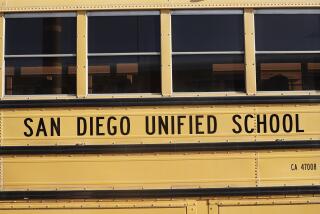SAN JUAN CAPISTRANO : School Board to Weigh Morals Code
- Share via
A policy that would further define inappropriate personal relationships between students and school employees is being considered by the Capistrano Unified School District.
District officials said the policy is needed to remind teachers and other employees that they are not to date or become sexually involved with students and to give the district explicit guidelines to deal with those who do.
The district’s teachers union approved the policy during recent contract negotiations, but officials of the Capistrano Unified Education Assn. said that their endorsement was reluctant and that the policy is an unnecessary duplication of state criminal and education law.
The policy would bar district employees “from dating any minor pupil of the district or becoming involved in any meretricious behavior or otherwise intimate, personal relationship with any minor pupil of the district.”
It also calls on an employee “to impress upon his/her pupils the principles of morality” and to conduct themselves “in a manner that enhances the welfare and interests of pupils of this district and avoids impairment of one’s ability to perform his or her duties.” The policy is scheduled to be sent to the Board of Trustees for approval next month.
The district was stung last year when a Dana Hills High School science teacher was convicted of fondling a 17-year-old female student during a field trip. The teacher, Michael W. Gaskins, pleaded no contest to sexual battery in Inyo County court last month and was sentenced to one year in prison. He resigned as a teacher.
William Eller, the district’s assistant superintendent of instructional operations, said the code could help the district avoid similar incidents in the future.
He said district administrators occasionally become aware of relationships between students and employees that might be inappropriate. He estimated the number at less than five a year and said most allegations of such behavior turn out to be false.
“But one (true case) is too many,” he said. He agreed that the proposed policy may somewhat duplicate the state codes but added that it is designed to curb inappropriate relationships before they happen.
“The (state) codes are not proactive,” Eller said. “Before the codes can be applied, something must have happened, and then it’s too late. With this policy, a principal who believes that a teacher is acting inappropriately will be allowed to approach the teacher and tell him these are the facts that are known and get a response. Also, if a student is acting inappropriately toward a teacher, the teacher can approach the principal to seek help in disengaging that behavior.”
He said, however, that the policy cannot be used by the district to fire employees, but only to approach and caution them.
Ric Stephenson, the teachers union president, said that his organization does not approve of teachers becoming intimately involved with students but that he fears the proposed policy could be used by administrators to harass teachers.
“It is our belief that the education and criminal codes adequately cover this issue,” he said.
More to Read
Sign up for Essential California
The most important California stories and recommendations in your inbox every morning.
You may occasionally receive promotional content from the Los Angeles Times.













